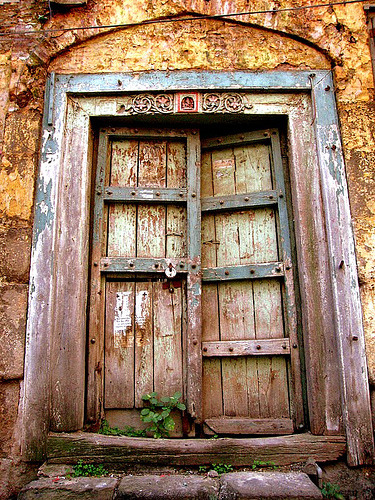This is from "Record of a Journey," by the contemporary Korean poet Hahm Dong-seon:
If I go to my old home,
 If I go to my old home on this journey,
If I go to my old home on this journey, I will see the doorway where we once stood
Gauging our height with a notched string
Gone slack by now like an old clothesline
anchored to a pole.
And in this train that rattles with speed
I watch the wind-pulled stalks of corn
Lean their weight toward the passenger cars
That stir the same insects I fanned away
when I was a child--
....
And this poem, by another contemporary Korean poet, Choi Young-mi:
Some Reincarnation
I do not believe the proposition
that spirits come around in April
as buds, as flowers.
I do not believe the poem that claims
the shades that left the earth in May
weep dolefully, changed to wind.
I cannot believe the song
that says the young one (I was standing right there)
that fell on the rowdy street in June
has now assumed the form of a flower, or wind,
or anything else.
I cannot even dream it.
Back from the dead, this morning opens its eyes
with minimum travel,
no need to roam like a flower, like wind.
When the desk lamp flickers on
a riot of voices rushes straight for me.
The idea of being pulled into another life, or into a memory of another life--'has now assumed the form of a flower'--reminds me of Walt Whitman's "To A Stranger," well known, but worth quoting:
Passing stranger! you do not know how longingly I look upon you,
"I am not to speak to you"-- this is also Choi Young-mi, from "The Mind's Mediterranean"
....I'm waiting for the perfection of silence.
Like the noon sun that departs
after warming my forehead,
like the fog that clears quickly
after its slow rising.
These lines lead me to Ruth Stone, "From the Porch." A wonderful poet, just looking:
What is a wild tree
but the tops of the maples
but the tops of the maples
when a storm
brawls up the mountain.
 Or chokecherry smothering
Or chokecherry smotheringthe barn with its interlocking roots,
Or the entire mountain in September--
yellow and scarlet
and then turning brown
from the mountaintop,
slowly descending in front,
the dirt road
swirling past in a flutter of leaves.
All simple poems--from Seoul and Brooklyn and Vermont--records of what we might see if we can remain awake and pay attention. Wendell Berry puts the matter of paying attention about as well as any poet I know:
What We Need Is Here
Geese appear high over us,
pass, and the sky closes. Abandon,
as in love or sleep, holds
them to their way, clear
in the ancient faith: what we need
is here. And we pray, not
for new earth or heaven, but to be
quiet in heart, and in eye,
clear. What we need is here.
 Poems by Hahm Don-seon and Choi Young-mi quoted from the translations of Yu Jung-yul and James Kimbrell, Three Poets of Modern Korea, published by Sarabande Books http://www.sarabandebooks.org/
Poems by Hahm Don-seon and Choi Young-mi quoted from the translations of Yu Jung-yul and James Kimbrell, Three Poets of Modern Korea, published by Sarabande Books http://www.sarabandebooks.org/George Ovitt (2/8/13)
Hello. Do you know in what year Dong-seon's poem ?In tunner number 3' was written?. Regards, Silvia Veloso
ReplyDeleteI'm sorry to say that I don't know the exact year. Hahm Dong Seon has enjoyed a long and distinguished career, from the middle 1970's on...I only have access to what has been translated, which isn't much. Sorry I can't help you. go
Delete